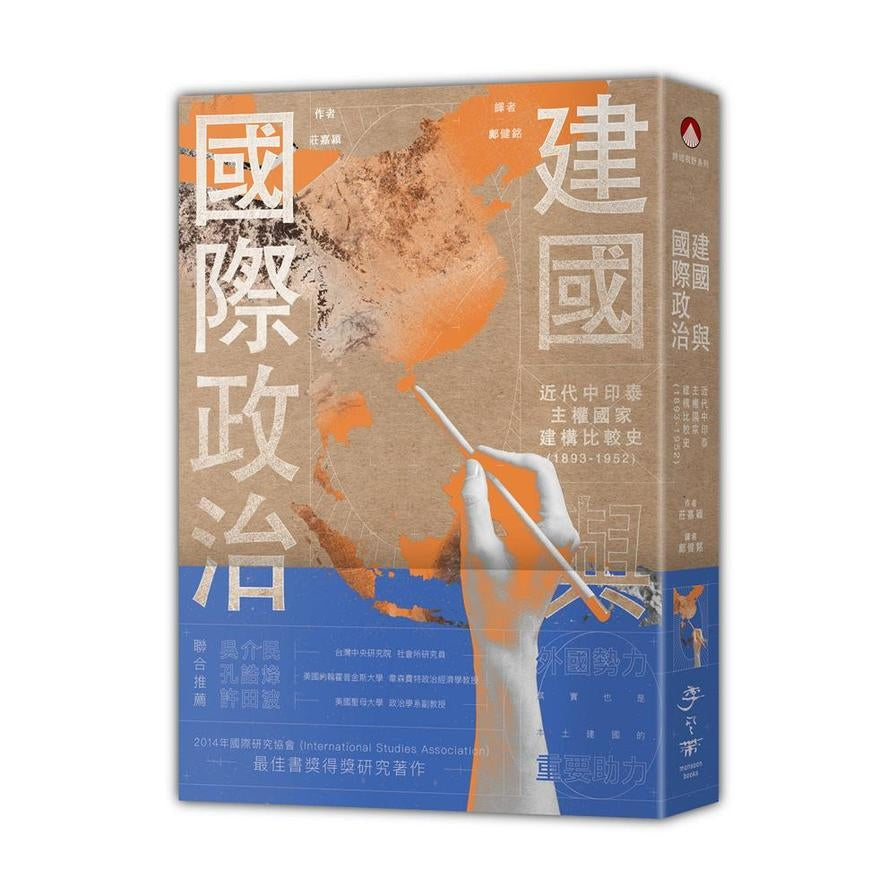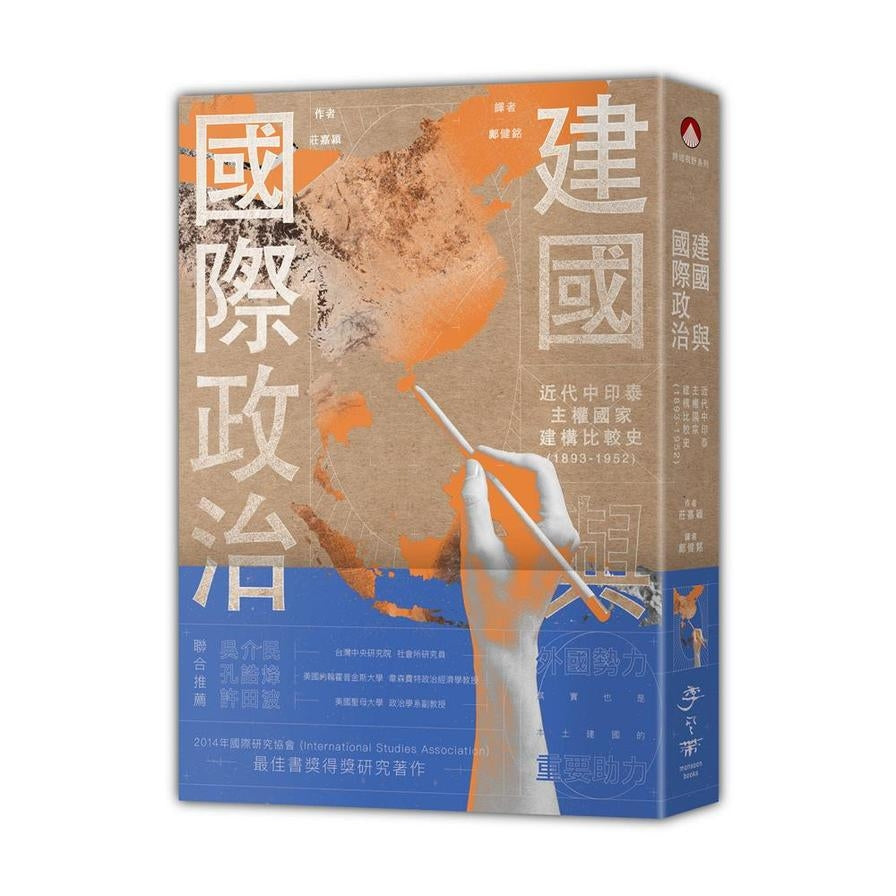Nation-building and International Politics: A Brief History of the Construction of National Sovereignty in China, India, and Thailand (1893-1952)
Nation-building and International Politics: A Brief History of the Construction of National Sovereignty in China, India, and Thailand (1893-1952)
5 in stock
Couldn't load pickup availability
出版社: 季风带
ISBN/EAN: 9789869745888
出版日期: 2020-12-05
页数: 488页
语言: Traditional Chinese
• What is the relationship between nation-building and “foreign influence”?
• What are the blind spots in nationalist discourse regarding “foreign influence” and nation-building?
• In modern times, how did sovereign states gradually become the mainstream state form among countries?
In recent years, the Hong Kong issue has become an international focal point. China's usual diplomatic response is that "the Hong Kong Special Administrative Region's legislation for safeguarding national security is purely China's internal affairs, and no foreign country has the right to interfere. Furthermore, no country in the world would allow secessionist activities or other activities that endanger national security to take place on its territory." Recent US actions toward Taiwan have also drawn diplomatic responses from China, with Chinese officials frequently accusing the US of "gross interference in China's internal affairs."
In official Chinese narratives, "foreign forces" divide the nation, weaken the central government's authority, and prevent local governments from exercising autonomy over their own destiny. This echoes past nationalist narratives. Singaporean scholar Zhuang Jiaying, in his book "Nation-Building and International Politics: A Comparative History of the Construction of Sovereign States in Modern China, India, and Thailand (1893-1952)," overturns this existing view. Zhuang argues that in the process of building modern sovereign states in China, Indonesia, and Thailand, foreign forces were actually crucial in safeguarding national territorial integrity, diplomatic autonomy, and even sovereignty. Contrary to nationalist assumptions, the successful establishment of national sovereignty hinges on foreign powers' assessment of the opportunity costs of intervening in local politics. National consciousness can be a product of the establishment of national sovereignty, not its cause.
In the era of globalization, domestic and international politics are inextricably linked. "Nationbuilding and International Politics: A Comparative History of the Construction of Sovereign States in Modern China, India, and Thailand (1893-1952)" is a civic textbook that helps reflect on the meaning of national sovereignty.
Zhuang Jiaying
Currently an associate professor in the Department of Political Science at the National University of Singapore, his research interests include international relations, comparative politics, and political sociology. His research covers topics such as alliance structures, political system transformation, contentious politics, external intervention, Asian security, Chinese diplomacy, and Sino-US relations. He is currently a member of the editorial board of Asian Survey and has served as a visiting scholar at the Harvard-Yenching Institute, an associate editor of International Studies Review , and a member of the editorial board of the National Bureau of Asian Research's Maritime Awareness.
Project International Advisory Committee, Asia Scholar at the East-West Center in Washington, D.C., and Research Fellow at the Center for International and Strategic Studies (CSIS).
Academic works:
His work has been published in journals such as World Economics and Politics, Asian Security, China Quarterly, Contemporary Southeast Asia, East Asia Forum, European Journal of International Relations, International Security, Security Studies, The National Interest , and Twentieth Century China.
Books:
External Intervention and the Politics of State Formation China, Indonesia, and Thailand, 1893–1952 (Cambridge University Press, 2012) was the winner of the 2014 Book of the Year Award from the International Security Studies Section of the International Studies Association.
Kwong Kin Ming
Editor-in-Chief of Monsoon Culture, Taiwan. He studied at the Lee Kuan Yew School of Public Policy in Singapore and conducted research there. He is the author of The British Era: The Art of British Colonial Governance and Two Cities Confronted: The Singapore Model and Hong Kong's Future. He has co-authored books including China's Influence and the Center-Periphery: Tug of War in Hong Kong, Taiwan, and the Indo-Pacific (forthcoming), East Asia: Developments and Challenges, Hong Kong Under Chinese Rule: Economic Integration and Political Gridlock, and The Social Movement Era: The Trajectory of Hong Kong's Contentious Politics. His articles have appeared in The Diplomat and Asian Survey ; Hong Kong's Sing Tao Daily, Ming Pao, Economic Daily, Asia Weekly, Stand News, Initium Media, and Taiwan Review; Singapore's Channel NewsAsia and Lianhe Zaobao; Malaysia's Contemporary Review and Suihuo Review; Taiwan's Up News, New News, Wind Media, Key Review Network, and Story; and China's Candidate Project.
Preface (New Preface by the Author of the Chinese Edition ): The Shadow of External Competition: National Sovereignty and Foreign Influences ⊙ Zhuang Jiaying 3
Foreword (I) China as a dependent and independent variable ⊙ Wu Jiemin (Researcher, Institute of Sociology, Academia Sinica, Taiwan) 12
Preface (II) Breaking the False Binary Opposition Between “External Forces” and “Autonomy” ⊙ Kong Zhaofeng (Wessonfeldt Professor of Political Economy at Johns Hopkins University, USA) 19
Foreword (III) “Foreign Forces” Beyond Official Discourse ⊙ Xu Tianbo (Associate Professor, Department of Political Science, University of Notre Dame) 25
Introduction The Myth of the Sovereign State: The Imagination and Reality of Nation-building ⊙ Kuang Jianming29
Concept map of the book "Nation Building and International Politics" 35
Chapter 1 The Past and Present of “Sovereign States” — Reconstructing the Theory of Nation-building
1.1 The Establishment of National Sovereignty from a Historical Perspective50
1.2 Review of the History of Nation-Building in East Asia 54
1.3 State Form and Sovereign State 58
1.4 Research Cases and Historical Background 66
1.5 Conclusion 74
Chapter II: Founding of the Nation, Foreign Influence, and State Form
2.1 Nation-building theory and the role of foreign powers84
2.2 Three Alternative Theories of State Form Change 92
2.2.1 Ideology 93
2.2.2 Institutional Commitment Theory95
2.2.3 Theory of National Struggle 98
2.3 Theoretical Explanations of the Founding of Modern China, Indonesia, and Thailand 100
Chapter 3 Foreign Powers and the Confederation of Modern China (1893-1922)
3.1 Foreign Powers and Modern China’s Political Centralization, Territorial Autonomy, and External Autonomy 107
3.1.1 The Origins of Decentralization107
3.1.2 China’s territorial autonomy under foreign influence 114
3.1.3 Modern China’s Diplomatic Autonomy 115
3.2 Theoretical Explanation of China’s Confederationism 119
3.2.1 Ideology: Nationalism and Self-Determination 120
3.2.2 Institutional Commitment Theory: The Impact of Internal and External Troubles on China 124
3.2.3 National Struggle Theory: Accumulation of Local Power 130
3.2.4 Foreign Intervention and China’s Confederation 133
3.2.4.1 Foreign Powers and the Authority of the Central Government in Modern China 134
3.2.4.2 Foreign Powers and Modern China’s Territorial Independence 139
3.2.4.3 Foreign Powers and Modern China’s External Autonomy 144
3.3 Conclusion 145
Chapter 4 Behind China’s Confederation (1893-1922) — Foreign Intervention Model
4.1 UK National Strength and China's Opening Up150
4.1.1 The British version of China’s “Open Door” policy 156
4.2 US National Conditions and Interests in China 162
4.2.1 The American version of China’s “Open Door” policy167
4.3 Japan’s Development Goals in China 173
4.3.1 Japan’s Cautious Strategy towards China 179
4.4 Russian Empire in China 185
4.4.1 The Russian Proxy Governance Model in China 190
4.5 The China Policies of Germany, France, and Other Powers 194
4.6 Conclusion 198
Chapter 5: China's Founding under Foreign Influence (1923-1952)
5.1 Japan's Imperial Management in China 210
5.1.1 Japan’s Hawkish Policy Towards China 215
5.2 The decline of British power in China 222
5.2.1 The UK’s increasingly weak version of China’s “open door” policy 229
5.3 The United States’ claim to share interests in China 235
5.3.1 The American version of China’s “Open Door” policy 240
5.4 The Soviet Union’s Role in China 249
5.4.1 The Soviet Union's Ways of Rejecting Other Powers in China 253
5.5 Germany’s China Policy 264
5.6 France’s passive policy towards China 268
5.7 Conclusion 270
Chapter 6: Foreign Powers as Assistance to China's Founding
6.1 The High Cost of Intervention in China’s Affairs from the Perspective of Foreign Powers 276
6.2 Changes in the State Form during China's Confederation Period 284
6.2.1 Political Centralization 284
6.2.2 Territorial autonomy 287
6.2.3 External autonomy 289
6.3 China’s Path Towards Establishing National Sovereignty 290
6.3.1 Political Centralization 291
6.3.2 Territorial autonomy 292
6.3.3 External autonomy 294
6.4 Theoretical Explanations of China’s Founding 296
6.4.1 Ideology: Nationalism and the Quest for Self-Determination 296
6.4.2 Institutional Commitment Theory – Peasant Uprisings 299
6.4.3 Theory of National Struggle: Capital and Force 302
6.5 Conclusion 305
Chapter 7 Foreign Powers and the Founding of Indonesia (1893-1952)
7.1 Foreign Activities during the Dutch East Indies Colonial Era (1893-1922) 310
7.1.1 Opportunity Cost Assessment and Action of External Intervention 311
7.1.2 The Development of British Power in the Dutch East Indies 315
7.1.3 Japan and the United States’ stances 317
7.1.4 The stances of France, Germany, and Russia 317
7.2 The Polity of the Dutch East Indies Colony in the Late Colonial Era 319
7.2.1 Political Centralization 319
7.2.2 Territorial autonomy 322
7.2.3 External autonomy 323
7.3 The Increase in the Opportunity Cost of External Intervention and the Establishment of Indonesian Sovereignty (1923-1952) 324
7.3.2 Japan’s Changing Approach to the Assessment of the Opportunity Costs of Intervention 330
7.3.3 The United States’ attitude towards the Dutch East Indies 331
7.3.4 Britain’s attitude towards the Dutch East Indies 334
7.3.5 The Soviet Union’s stance on the Dutch East Indies
7.4 Changes in Indonesia’s Political System 338
7.4.1 Dutch colonial era 338
7.4.1.1 Political Centralization 338
7.4.1.2 External and territorial autonomy 340
7.4.2 Japanese colonial rule 341
7.4.2.1 Political Centralization 342
7.4.2.2 External and territorial autonomy 343
7.4.3 After the Revolution 344
7.4.3.1 Political Centralization 345
7.5 Theoretical Explanations of Indonesia’s Founding 349
7.5.1 Ideology 350
7.5.2 Theory of National Struggle 351
7.5.3 Institutional Commitment Theory 351
7.6 Conclusion 352
Chapter 8 Foreign Powers and the Founding of Thailand (1893-1952)
8.1 The Founding of Thailand under Foreign Influences (1893-1922) 356
8.1.1 Opportunity Cost Assessment of External Intervention 357
8.1.2 Britain’s Shared Thailand Claims 359
8.1.3 Limitations of French Empire Expansion 360
8.1.4 The attitudes of other powers 363
8.2 The Formation Process of Thailand’s Sovereign State Form 364
8.2.1 Political Centralization 364
8.2.2 Territorial autonomy 367
8.2.3 External autonomy 368
8.3 Foreign forces as a supporter of Thailand's nation-building 369
8.3.1 Opportunity Cost Assessment of External Intervention 369
8.3.1.1 Britain and France 370
8.3.1.2 Japan 372
8.3.1.3 United States 374
8.3.2 Political Centralization 379
8.4 Theoretical Explanations of Thailand’s Founding 382
8.4.1 Theory of National Struggle 382
8.4.2 Institutional Commitment Theory 382
8.4.3 Ideology 383
8.5 Conclusion 385
Chapter 9: Localization of International Politics, Internationalization of Comparative Politics: Foreign Powers and States in World Politics
9.1 Foreign Powers and Local Powers 391
9.2 External Intervention, Local Collaboration, and State Form 393
9.2.1 External Intervention and Nation-Building: Contemporary International Case Studies 395
9.3 The Myth of Nationalism 398
9.4 Research Approaches to the Future of Nation Building 401
9.5 Conclusion 404
Appendix Research Methodology: Deconstructing the Relationship between Foreign Powers and Indigenous Nation-Building 408
Bibliography 409
Share


